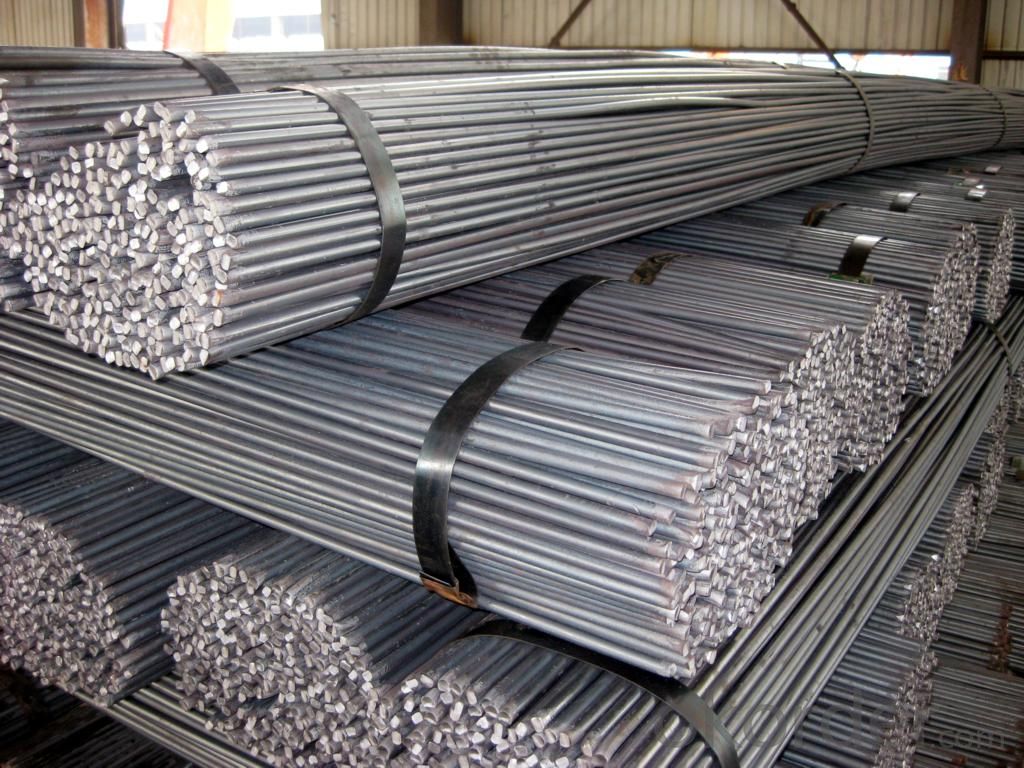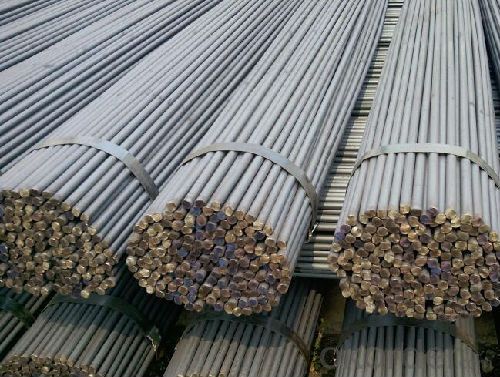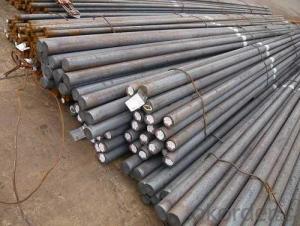Hot Rolled Iron Steel Round Bars in High Quality
- Loading Port:
- Tianjin
- Payment Terms:
- TT or LC
- Min Order Qty:
- 100 m.t.
- Supply Capability:
- 40000 m.t./month
OKorder Service Pledge
OKorder Financial Service
You Might Also Like
OKorder is offering Hot Rolled Iron Steel Round Bars in High Quality at great prices with worldwide shipping. Our supplier is a world-class manufacturer of steel, with our products utilized the world over. OKorder annually supplies products to African, South American and Asian markets. We provide quotations within 24 hours of receiving an inquiry and guarantee competitive prices.
Product Applications:
Hot Rolled Iron Steel Round Bars in High Quality are ideal for structural applications and are widely used in the construction of buildings and bridges, and the manufacturing, petrochemical, and transportation industries.
Product Advantages:
OKorder's Hot Rolled Iron Steel Round Bars in High Quality are durable, strong, and wide variety of sizes.
Main Product Features:
· Premium quality
· Prompt delivery & seaworthy packing (30 days after receiving deposit)
· Can be recycled and reused
· Mill test certification
· Professional Service
· Competitive pricing
Product Specifications:
Manufacture: Hot rolled
Grade: Q195 – 235
Certificates: ISO, SGS, BV, CIQ
Length: 6m – 12m, as per customer request
Packaging: Export packing, nude packing, bundled
Trademark | Rank | Chemical composition (quality score) % | |||||
C | Si | Mn | S | P | |||
≤ | ≤ | ≤ | |||||
Q235 | A | 0.14-0.22 | 0.30 | 0.30-0.65 | 0.050 | 0.045 | |
Q235 | B | 0.12-0.20 | 0.30 | 0.30-0.70 | 0.045 | 0.045 | |
Trademark | Rank | Pulling Test | |||||
Bend PointΔs/Mpa | Tensile Strength | Elongation Ratioδ5% | |||||
Thickness (Diameter) /MM | Thickness (Diameter) /MM | ||||||
≤16 | 16-40 | ≤16 | 16-40 | ||||
≥ | ≥ | ||||||
Q235 | A | 235 | 225 | 375-500 | 26 | 25 | |
Q235 | B | 235 | 225 | 375-500 | 26 | 25 | |
FAQ:
Q1: Why buy Materials & Equipment from OKorder.com?
A1: All products offered byOKorder.com are carefully selected from China's most reliable manufacturing enterprises. Through its ISO certifications, OKorder.com adheres to the highest standards and a commitment to supply chain safety and customer satisfaction.
Q2: How do we guarantee the quality of our products?
A2: We have established an advanced quality management system which conducts strict quality tests at every step, from raw materials to the final product. At the same time, we provide extensive follow-up service assurances as required.
Q3: How soon can we receive the product after purchase?
A3: Within three days of placing an order, we will arrange production. The normal sizes with the normal grade can be produced within one month. The specific shipping date is dependent upon international and government factors, the delivery to international main port about 45-60days.
Q4: How many tons of steel products could be loaded in containers?
A4: Usually the steel products are delivered by bulk vessel because of the large quantity and the freight. However, there are no bulk vessel enter some seaports so that we have to deliver the cargo by containers. The 6m steel product can be loaded in 20FT container, but the quantity is changed according to the size, usually from 18tons to 25tons.
Q5: what is the difference between actual weight and theoretical weight?
A5: All the section steel has two weights: actual weight and theoretical weight. Actual weight is the weighing out when the product delivered from the mill. Theoretical weight is calculated by pieces. The invoice can be based on each of them as your request.
Images:


- Q:What are the considerations for selecting the right steel grade for a round bar?
- There are various factors to consider when choosing the appropriate steel grade for a round bar. To begin with, the intended application of the round bar should be taken into account. Different steel grades possess distinct properties that make them suitable for specific purposes. For instance, stainless steel or high-alloy steel, which have exceptional heat resistance, would be ideal for use in high-temperature environments. Conversely, carbon steel, with its good strength and ductility, may be more appropriate for structural applications. Another factor to consider is the desired mechanical properties of the round bar, including tensile strength, yield strength, hardness, and toughness. These properties can vary significantly among different steel grades, so it is crucial to select a grade that meets the specific requirements of the application. Corrosion resistance is also an important consideration. If the round bar will be exposed to corrosive environments, such as in marine or chemical applications, it is advisable to choose a stainless steel grade with high resistance to corrosion. On the other hand, if corrosion resistance is not a major concern, a carbon steel grade may be more cost-effective. Cost is another factor to be taken into account. Different steel grades have varying costs based on availability, demand, and manufacturing processes. It is important to strike a balance between the desired properties of the round bar and the available budget to ensure cost-effectiveness. Moreover, the manufacturability of the steel grade should be considered. Some steel grades may be more challenging to machine or weld, which can impact the production process and cost. It is crucial to select a readily available steel grade that can be easily processed to meet the required specifications. Finally, it is always advisable to seek guidance from steel suppliers, engineers, or metallurgists to ensure that the chosen steel grade aligns with the specific requirements of the application. Their expertise and experience in the industry can provide valuable insights and recommendations.
- Q:How are steel round bars classified based on their shape?
- Steel round bars can be categorized into two main groups, namely hot-rolled round bars and cold-drawn round bars, depending on their shape. Hot-rolled round bars are produced by heating a steel billet until it becomes malleable and then passing it through a series of rollers to achieve the desired shape. This manufacturing process results in a rougher surface texture and a slightly larger diameter when compared to cold-drawn round bars. Hot-rolled round bars find common usage in construction, engineering, and manufacturing applications where strength and durability play a crucial role. On the other hand, cold-drawn round bars are manufactured by pulling a hot-rolled round bar through a series of dies at room temperature. This process enhances the dimensional accuracy, surface finish, and mechanical properties of the steel. Cold-drawn round bars possess a smoother surface texture and a more precise diameter, making them suitable for applications that demand tight tolerances, such as precision machining, automotive components, and machinery shafts. In conclusion, the classification of steel round bars, based on their shape, is determined by the specific manufacturing process employed. Hot-rolled round bars exhibit rougher surfaces and slightly larger diameters, while cold-drawn round bars boast smoother surfaces and more precise dimensions. The choice between these two categories depends on the specific requirements of the given application.
- Q:Can steel round bars be used in the production of fasteners?
- Yes, steel round bars can be used in the production of fasteners. Steel round bars are commonly used as a raw material in the manufacturing of various types of fasteners such as bolts, screws, nuts, and studs. The round shape of steel bars allows for easier machining and forming processes required to create threaded or non-threaded fasteners. Steel is a popular choice for fasteners due to its strength, durability, and resistance to corrosion. Additionally, steel round bars can be easily heat-treated to improve their mechanical properties, making them suitable for a wide range of fastening applications in various industries.
- Q:What is the tensile strength of steel round bars?
- The tensile strength of steel round bars can vary depending on the specific grade or type of steel being used. However, on average, steel round bars have a tensile strength ranging from 400 to 500 megapascals (MPa). This means that steel round bars can withstand a pulling or stretching force of 400 to 500 MPa before experiencing permanent deformation or fracture. It is important to note that different grades of steel, such as mild steel, carbon steel, or alloy steel, may have different tensile strength values. Additionally, factors such as heat treatment, manufacturing process, and size of the round bar can also affect its tensile strength. Therefore, it is recommended to consult the specific manufacturer or supplier for accurate and precise information on the tensile strength of a particular steel round bar.
- Q:Are steel round bars suitable for the production of bearings?
- No, steel round bars are not suitable for the production of bearings. Bearings require materials that have specific properties such as high hardness, wear resistance, and low friction coefficient. Steel round bars do not possess these characteristics in their natural state and would need additional processing and treatments to acquire the necessary properties for bearing production. Bearing materials are typically selected from alloys such as stainless steel, chrome steel, or ceramic materials that are specifically engineered to withstand the demanding conditions and provide optimal performance.
- Q:Difference between round bar and threaded steel in use.
- The rebar is much higher than the ordinary, and the low carbon steel rounds are much higher. The heat treated steel is much stronger than the low carbon round steel, nearly twice or even higher.
- Q:What are the different types of steel round bar surface treatments used in the automotive industry?
- In the automotive industry, the most common types of steel round bar surface treatments used are galvanization, electroplating, and powder coating. Galvanization involves coating the steel with a layer of zinc to protect it from corrosion. Electroplating is a process where a thin layer of another metal, such as chrome or nickel, is applied to the steel surface for enhanced aesthetics and protection. Powder coating, on the other hand, involves applying a dry powder to the steel surface and then curing it under high heat to create a durable and attractive finish. These surface treatments help improve the durability, appearance, and overall performance of steel round bars used in automotive applications.
- Q:Can steel round bars be used in the manufacturing of bearings?
- Yes, steel round bars can be used in the manufacturing of bearings. Steel is a common material used for bearing manufacturing due to its high strength, durability, and ability to withstand heavy loads and friction. The steel round bars are typically machined and processed to form the bearing components, such as the inner and outer rings, rollers, or balls, which are then assembled to create the final bearing product.
- Q:What are the different types of steel round bar alloys?
- Some of the different types of steel round bar alloys include carbon steel, alloy steel, stainless steel, tool steel, and high-speed steel.
- Q:What are the typical tolerances for steel round bars?
- The typical tolerances for steel round bars can vary depending on the specific requirements of the application or industry. However, there are generally accepted standard tolerances that are commonly used. For diameter, the typical tolerances for steel round bars are usually within a few thousandths of an inch. This means that the actual diameter of the bar can deviate slightly from the specified diameter, but it will still fall within an acceptable range. In terms of straightness, steel round bars are commonly produced with a straightness tolerance that allows for some deviation from a perfectly straight line. The typical tolerance for straightness is usually measured in units of inches per foot or millimeters per meter. This means that the bar may have a slight bend or curve, but it should not exceed the specified tolerance. Surface finish is another important aspect of steel round bars. The typical tolerance for surface finish is usually specified in terms of roughness average (Ra) or surface roughness in micrometers. This tolerance ensures that the surface of the bar is smooth and free from any significant imperfections, such as pits or scratches. It is important to note that these typical tolerances can vary depending on the specific grade or type of steel being used, as well as the intended application. In some cases, tighter tolerances may be required for precision or critical applications, while looser tolerances may be acceptable for less demanding applications. Therefore, it is always recommended to consult the relevant industry standards or specifications to determine the specific tolerances required for a particular steel round bar.
1. Manufacturer Overview |
|
|---|---|
| Location | |
| Year Established | |
| Annual Output Value | |
| Main Markets | |
| Company Certifications | |
2. Manufacturer Certificates |
|
|---|---|
| a) Certification Name | |
| Range | |
| Reference | |
| Validity Period | |
3. Manufacturer Capability |
|
|---|---|
| a)Trade Capacity | |
| Nearest Port | |
| Export Percentage | |
| No.of Employees in Trade Department | |
| Language Spoken: | |
| b)Factory Information | |
| Factory Size: | |
| No. of Production Lines | |
| Contract Manufacturing | |
| Product Price Range | |
Send your message to us
Hot Rolled Iron Steel Round Bars in High Quality
- Loading Port:
- Tianjin
- Payment Terms:
- TT or LC
- Min Order Qty:
- 100 m.t.
- Supply Capability:
- 40000 m.t./month
OKorder Service Pledge
OKorder Financial Service
Similar products
New products
Hot products
Related keywords































